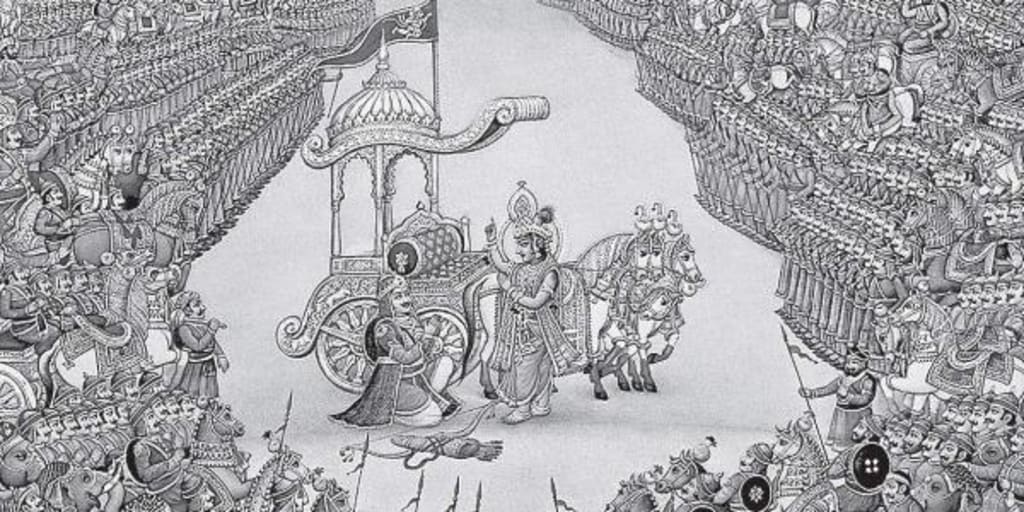The Practical Divine
Finding Secular Value In Religious Texts

At the conclusion of the Mahābhārata, an Indian epic about the Kurukṣetra War, tens of thousands are dead and only five brothers from the victorious Pandava clan and their wife—yeah, just the one for all five—survive. When these stories are recited in temples, the spotlight, predictably, is on the religious aspects: how one should live and act in accordance with the tenets of Hinduism. The pundits generally skip over the good bits: the carnage, the violence, and the polyandry, especially the polyandry. I recently read the Mahābhārata and found the book teeming with practical advice.
Take for instance the Bhagavad Gita, the 700-verse philosophical treatise in the Mahābhārata between the Pandava prince Arjuna and his divine charioteer and moral guide Lord Krishna. Arjuna, like Shakespeare’s Hamlet, finds himself fighting for a crown he doesn’t really want but feels obligated to defend simply because he must. Moments before the battle is to begin, Arjuna stands atop his chariot and surveys the field; he sees equal presence of family in both armies and anguishes at the sight of, “grandfathers, teachers, maternal uncles, brothers, sons, grandsons, [and] friends” occupying the field of battle. He realizes that he will have to kill people he’s known, grown up with, and loved all of his life. Hypothetically upholding Good, especially against some archetypal enemy, is easy but when it’s kin, suddenly the stakes become greater. So, Arjuna drops his bow and refuses to fight. And his trepidation is no light matter because as a Ksatriya or—the warrior caste within the Hindu hierarchy—declining to engage in battle would prove disastrous both spiritually and socially.
During this crisis Arjuna comes across less like a conflicted warrior and more like an angsty teenager. He is incapable of thinking analytically and therefore unable to represent his ideas in any original way. Still, as the Pandavas’ primary warrior and the central figure, he has to fight. In order to push his whiny disciple past his paralysis, Krishna offers logic: fighting against the unrighteous is literally his duty as a kshatriya because both his world and the world rely on warriors to defeat physical manifestations of evil. This, of course, isn’t sufficient. So, Krishna tells him that the outcome of the war has already been decided.
“O Arjuna,” declares Krishna, “[all your enemies] have already been destroyed by me, just be my instrument.”
The assertion should seem bizarre since the battle has yet to begin and everyone is still very much alive. Krishna’s proclamation works and settles the warrior because it unburdens him. He picks up his weapon and becomes the instrument, which requires killing family for the proverbial greater Good.
At first glance, this exchange between a conflicted warrior and his transcendental guide seem to be typical religious jargon, impractical for its reliance on absolute faith. But an allegorical reading unearths its utility. What Krishna essentially does is introduce determinism, effectively relegating Arjuna to a tool in a predetermined narrative much more complicated and larger than the any single person. By lifting the encumbrance of action and its consequence, Arjuna can proceed and just act. Arjuna’s primary concern is that killing is sinful and killing family, well, that’s a double no-no. But Krishna shows him that his reality, the terrestrial reality is temporary, and so focusing on the results of a reality that is not going to last is foolish. Instead, Krishna guides the young warrior to concentrate on and emphasize the work at hand and to abandon his desire to predict the possible implications of his actions.
None of us will have to slay a cousin because they started a war and so the point of this story is to show how to perform a task meditatively, to detach self-interest from labor because a result-oriented outlook will inevitably force your mind to think, then think some more, and then over-think, leaving you mentally incapacitated. This rather ordinary idea can help deal with the monotony of work. Looking beyond the religious overtones of this allegory reveals a lesson in focus and duty. The wisest man, according to Krishna, is one that lives in the transient earthly world without concerning themselves with results; it’s the person that discovers serenity in their work, tuning out the persistent chaos of the universe. Religious works are full of these commonplace ideas that are practical and can be extremely useful.
No, this isn’t a call for people to head to the nearest church, temple, or ashram. Or purpose that reading religious books will lead to an epiphany. And in most cases being religious doesn’t make people any better or worse. Organized religion’s flaws are so well known that they’re practically clichés at this point. However, there is a movement in our time to reject religious knowledge in favor of secular. Schools and universities eschew religious books in classrooms even though they have great literary value. We obviously need secular education, but it doesn’t have to come at the cost of religious teachings. The Gita, Bible, Tora, or Quran are rich philosophical texts possessing practical lessons.
About the Creator
Rohit Lanez-Sharma
Just trying to write, fam.






Comments
There are no comments for this story
Be the first to respond and start the conversation.